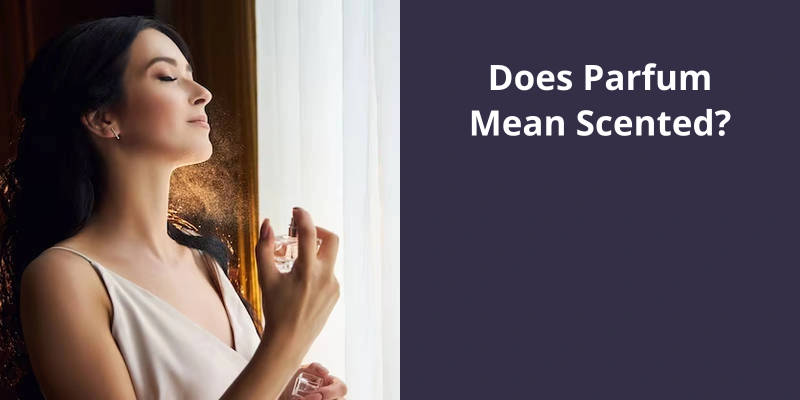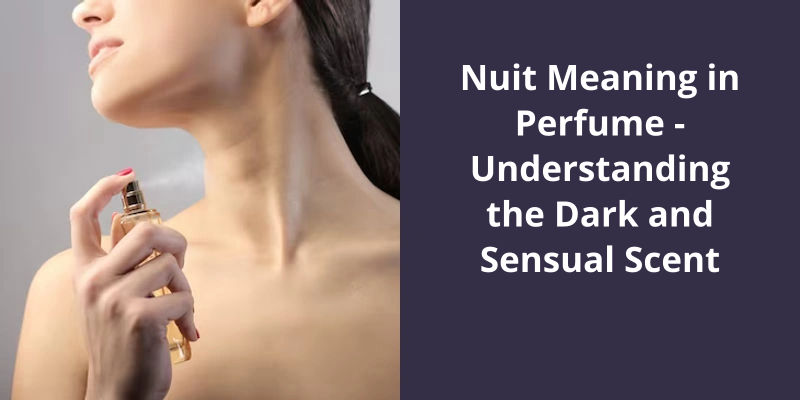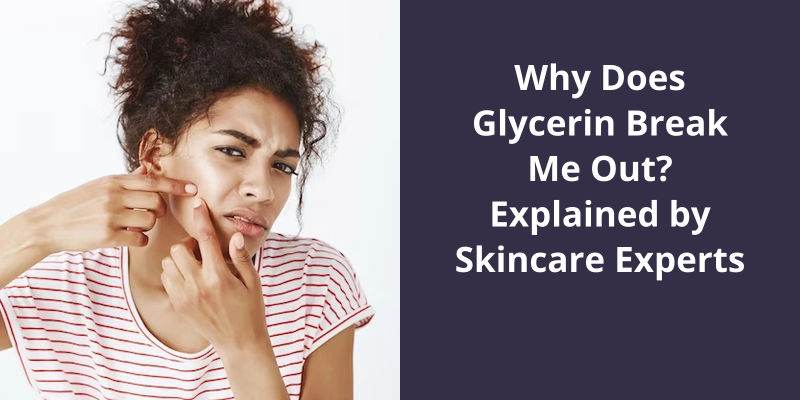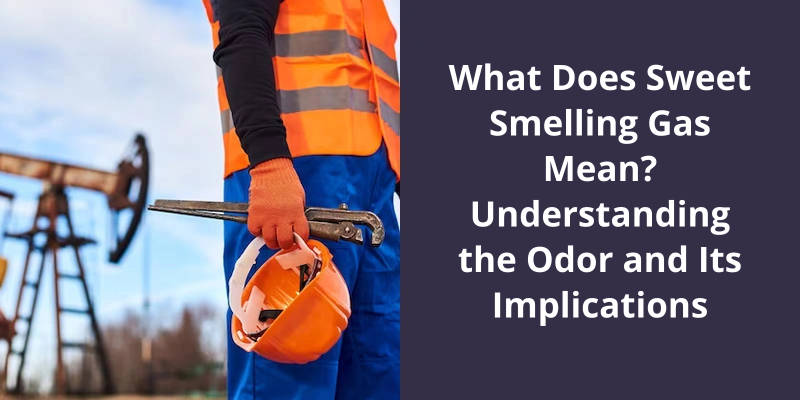Yes, ‘Parfum’ does mean scented. The term is popularly used in the fragrance industry and refers to the highest concentration of fragrance, making it more potent and long-lasting than other fragrance types like Eau de Toilette or Eau de Cologne. So, when you see ‘Parfum’ on a fragrance bottle, it means that the product is scented, typically with a high concentration of essential oils or perfume extracts, lasting longer on the skin and emitting a strong scent.

What Is Parfum in Skin Care?
Parfum, also known as fragrance, plays a significant role in the world of skincare. When you see the word “fragrance” or “parfum” on a product label, it usually refers to a blend of different scent chemicals and ingredients used to create a pleasant smell. However, it’s essential to note that the specific components of the fragrance are undisclosed, and this lack of transparency raises concerns.
One such concern is the use of diethyl phthalate, a common fragrance dispersant, in the formulation of parfum. Diethyl phthalate has been linked to potential health risks, including hormone disruption and reproductive issues. Due to it’s undisclosed nature, it becomes difficult for consumers to know exactly what they’re exposing their skin to.
Moreover, the ambiguity surrounding parfum makes it challenging for individuals with specific sensitivities or allergies to navigate the world of skincare. For those with fragrance allergies or sensitivities, the presence of parfum can lead to adverse reactions such as skin irritation, redness, or rashes. Without detailed ingredient listings, it becomes difficult for consumers to make informed decisions about the products they use on their skin.
Alternatives to Parfum in Skincare: Exploring Fragrance-Free or Unscented Skincare Options and Their Benefits.
- Skincare products without added fragrance
- Unscented lotions and creams
- Fragrance-free cleansers
- Hypoallergenic moisturizers
- Non-irritating serums
- Gentle toners without fragrance
- Sensitive skin-friendly sunscreens
- Perfume-free face masks
- Aromatherapy-free body oils
- Fragranceless exfoliators
When it comes to choosing a fragrance, the type of concentration matters. Eau de parfum offers a longer-lasting and more intense scent compared to eau de toilette. It’s higher concentration of fragrance makes it an excellent choice for those who want a scent to linger throughout the day. On the other hand, eau de toilette is more lightweight and meant to be applied generously. Finding the perfect balance of concentration can enhance your fragrance experience and leave a lasting impression.
Why Is Parfum Better?
Parfum, as the term suggests, refers to a highly concentrated form of fragrance that exudes a powerful and long-lasting scent. Unlike other fragrance options such as eau de parfum, which is akin to a body splash meant for a more liberal application, parfum is known for it’s potency and longevity. This can be attributed to the significantly higher concentration of fragrance oils present in parfum compared to other perfume types.
This is particularly appealing for those seeking a scent that can endure throughout the day or even well into the evening. The strong and distinct aroma emanating from parfum can truly make a statement and leave a lasting impression on those around you.
Just a few drops of parfum can go a long way, making it an economical choice in the long run. This is in stark contrast to other perfume options that may require a more generous application to achieve the same level of intensity and staying power.
Another advantage of parfum is it’s ability to evolve over time on the wearers skin. As the fragrance interacts with body heat and chemistry, it develops in layers, gradually unveiling different notes and nuances. This complex and multifaceted nature of parfum adds depth and interest to the overall olfactory experience, enhancing it’s allure further.
Perfume houses tend to use top-notch materials and take great care in formulating their parfum offerings to create a fragrance that’s rich, elegant, and alluring. This dedication to quality ensures that parfum wearers not only enjoy a longer-lasting scent but also indulge in a truly lavish and captivating olfactory experience.
The Process of Creating Parfum: Discuss the Intricate and Meticulous Process Involved in Crafting Parfum, Including Sourcing High-Quality Ingredients and the Art of Blending Fragrances.
Creating parfum is a complex and meticulous process that involves sourcing high-quality ingredients and mastering the art of blending fragrances. Perfumers carefully select and gather aromatic substances, such as essential oils and synthetic fragrances, from various natural sources. These ingredients are then mixed in precise proportions to achieve the desired scent profile.
The process of creating parfum requires expertise and a deep understanding of fragrance notes. Each fragrance note has it’s own unique characteristic, ranging from citrus and floral to woody and musky. Perfumers skillfully combine these notes, layering them to create depth and complexity in the fragrance.
In addition to selecting and blending fragrances, perfumers also need to consider the longevity and sillage (the trail left behind by the fragrance) of the parfum. They carefully balance the concentration of ingredients to ensure that the scent lasts on the skin without being overpowering.
The creation of parfum is truly an art form, requiring both technical skill and a creative flair. From sourcing the finest ingredients to blending fragrances with precision, every step in the process contributes to the final, scented masterpiece.
Perfume, or “parfum” in French, has a fascinating origins steeped in history and culture. It all started with the burning of incense by the Mesopotamians, where the fragrance was referred to as “parfum” due to it’s ability to thoroughly permeate the air with it’s smoke. This early form of scent eventually evolved into the fragrance we know today.
Why Is Perfume Called Parfum?
Throughout history, perfume has been associated with luxury, elegance, and seduction. The term “parfum” originated from the French language, which has been historically renowned for it’s sophistication in the field of fragrance.
The fragrant art of perfume-making was initially linked to the practice of burning incense. The Mesopotamians, a civilization that thrived over 4000 years ago, were the pioneers in crafting incense-based perfumes. These early forms of perfumes were created by blending various aromatic materials with resins and gums, then burning them to release captivating scents.
As perfume evolved and gained popularity, different cultures crafted their own unique versions. The Romans, for instance, embraced perfume and it’s scented offerings wholeheartedly. They carried small containers of scent with them everywhere they went and applied them liberally. This practice became a symbol of status and beauty for the elite.
In medieval Europe, perfume production was largely influenced by the Arab world. European crusaders brought back the knowledge of distillation, allowing perfumers to extract fragrant essences from flowers and plants. This marked the transition from incense-based fragrances to the more intricate, complex fragrances we know today.
The Influence of Arab Perfumers on European Perfume Production
- The introduction of new aromatic ingredients
- The development of innovative extraction techniques
- The establishment of trade routes for precious spices and fragrances
- The adoption of Arab fragrance traditions, such as layering scents
- The blending of Eastern and Western perfume styles
- The influence on packaging and presentation of perfumes
- The incorporation of Arabic aesthetics in perfume design
- The popularization of oud and other Arabian perfume notes
- The exchange of knowledge and expertise between Arab and European perfumers
- The preservation and revival of traditional perfume-making techniques
On the other hand, eau de toilette contains a lower concentration of essences, typically ranging from 5 to 10%. This means that while parfum boasts the richest and longest-lasting fragrance, eau de parfum offers a slightly lighter and more affordable option. It’s important to consider these distinctions when choosing a fragrance that suits your preferences and budget.
What Is Parfum vs Perfume?
It’s less concentrated than perfume but still provides a long-lasting scent. Eau de toilette, on the other hand, contains approximately 5-10% of essences diluted in alcohol. This makes it lighter and more suitable for everyday use. Lastly, eau de cologne has the lowest concentration, usually around 2-5%, making it the lightest and most refreshing option.
Parfum and perfume are often used interchangeably in English, but in the French language, parfum means scented. The term parfum is often associated with high-end, luxury fragrances, indicating a higher concentration of essences. However, the term “perfume” is more commonly used in the English-speaking world, encompassing a broader range of fragrances regardless of concentration.
When choosing a fragrance, it’s important to consider the concentration and personal preference. Perfume or parfum will provide a more intense and long-lasting scent, making it ideal for special occasions or when you want to make a statement. Eau de parfum offers a slightly lighter alternative, suitable for everyday wear. Eau de toilette and eau de cologne are perfect for those who prefer a subtle, refreshing scent that won’t overpower.
It’s worth noting that the longevity and projection of a fragrance can also depend on other factors such as the quality of ingredients and individual body chemistry. Therefore, it’s always recommended to try a fragrance on your skin before making a purchase to ensure it suits you.
So, the next time youre shopping for a new scent, pay attention to the concentration and choose the one that best suits your desired intensity and longevity.
Source: Perfume, eau de parfum or eau de toilette – Galimard
It’s important to understand the distinctions between scent, fragrance, and perfume. While fragrance and aroma refer to the unique scents emitted, fragrance is more commonly associated with perfumes, while aroma is often used in the context of food. On the other hand, perfume refers to the actual substance, whether in liquid or solid form, that humans utilize to enhance their olfactory experiences.
What Is the Difference Between Scent Fragrance and Perfume?
When it comes to the world of scents and fragrances, there can be some confusion surrounding the terms used to describe them. One common question that often arises is whether or not “parfum” means scented. To fully understand the answer to this question, it’s important to first distinguish between scent, fragrance, and perfume.
A scent is simply the unique smell that’s given off by a particular object or substance. It can be pleasant or unpleasant, and it’s often used to describe the natural aroma of things such as flowers, fruits, or even certain animals. Conversely, a fragrance is the combination of essences that create a distinct and pleasing smell. Fragrances are commonly used in perfumes, colognes, and other scented products.
It’s typically found in liquid or solid form and includes a combination of fragrant ingredients. These ingredients can vary greatly, from natural essential oils derived from plants to synthetic compounds created in a laboratory. The purpose of perfume is to provide a pleasing and long-lasting scent when applied to the body.
Perfume, on the other hand, is a substance designed to enhance our sense of smell and typically takes the form of a liquid or solid.
Conclusion
It’s crucial to understand that this umbrella term encompasses a wide range of substances, which may include both natural and synthetic components. Therefore, when looking for scented products or attempting to avoid specific fragrances, it’s important to examine the ingredient list in detail, as these generic terms don’t provide specific information about the scent itself.





